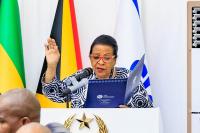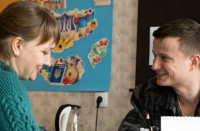African women join the fight for equality and access to climate finance

In the halls of Africa Climate Week in Addis Ababa, Ethiopia, stories abound that show how climate change impacts the daily lives of women on the continent. While leaders discuss mitigation and adaptation strategies, millions of African women still spend hours every day fetching water or firewood, tasks made more arduous by environmental degradation.
The mission to value African female leadership, promote concrete policy proposals and insert feminist demands at the center of the Africa Climate Summit declaration and the COP30 outcomes were the highlights of Climate Week's Gender Day, which highlighted the leading role of African women and feminist movements in discussions about climate justice on the continent.
In sub-Saharan African countries with available data, women and girls spend many hours a day collecting water, according to the Women's International Environment Programme (WEP). This burden highlights how the lack of access to clean water weighs disproportionately on them, taking away time that could be devoted to education, paid work, entrepreneurship, and political participation. The disparity is further exacerbated by the fact that women spend up to five times more hours than men on unpaid work—also in sub-Saharan Africa, 3.1 times more; in North Africa and Western Asia, 4.9 times more.
Energy exclusion is another critical factor. 600 million Africans still live without access to electricity. This shortage falls particularly heavily on women, who are trapped in manual labor and unable to fully participate in economic and political life. Many also cook with wood or charcoal on rudimentary stoves indoors, exposing them to serious respiratory illnesses caused by inhaling toxic fumes, increasing the risk of burns, and requiring long hours of wood collection, a physical effort that further limits their opportunities for education and work.
The meeting highlighted that, although Africa is responsible for less than 4% of global greenhouse gas emissions, the continent faces severe impacts from global warming, including prolonged droughts, water scarcity, forest degradation, and increased food insecurity. Women, who play a central role in managing natural resources and maintaining communities, are the most affected, facing the risk of violence and difficulties accessing essential care.
Gender Day reinforced the importance of women's participation as a matter of justice and efficiency. African women are leaders, innovators, and holders of traditional knowledge essential to climate adaptation and mitigation. In several communities, they lead regenerative agriculture practices, solar energy projects, and forest conservation initiatives, demonstrating that combating the climate crisis can also be a path to emancipation.
African communities already practice adaptation and sustainable resource use strategies, which can serve as a global model, according to studies by the Program . However, there is a critical funding gap. It is estimated that the continent requires approximately US$250 billion annually for adaptation and mitigation, but receives only a fraction of this amount, while the global commitment of US$100 billion has not yet been fully met.

Climate finance and gender equality
Among the solutions discussed, the promotion of gender equity in all climate policies and programs stands out, ensuring that women are not only beneficiaries but also leaders in implementing strategies. Training in green technologies, access to climate education, and support for local initiatives were highlighted as essential for strengthening community resilience. Mobilizing the continent's own renewable resources, without dependence on imports, and building indigenous capacities are also key points.
Senegalese Doris Mpoumou, UN Women's Special Representative to the African Union and the United Nations Economic Commission for Africa, spoke about the complex challenges African women face in the face of the climate crisis and the solutions needed to strengthen their participation and leadership. According to her, the impacts of natural disasters affect men and women differently, making it essential that climate policies and decisions integrate recommendations from women themselves.
Mpoumou emphasized the need for simplification and greater accessibility in financing mechanisms, noting that access to resources is currently extremely difficult for African organizations working on climate adaptation. "It is crucial to ensure that financing mechanisms are accountable and truly meet the needs of communities," he stated, emphasizing that adequate resources are essential to implementing effective and sustainable solutions.
The Senegalese woman also reiterated the importance of including African and Afro-descendant women in all stages of decision-making, from document development to policy implementation, so that climate responses reflect their realities.
More women in international negotiations
The data presented shows that inequality remains evident in decision-making spaces. A survey by the Gender and Environment Data Alliance (GEDA) shows that, at COP29, only 32% of African delegates were women, while in 53 of the continent's 54 delegations, men were the majority. Another finding indicates that only 4 of the 54 African countries publish sex-disaggregated statistics on mortality from pollution or natural disasters.
Nigerian Priscilla Achakapa, president of the International Women for the Environment Program, assessed the challenges African women face in the face of the climate crisis and the innovative solutions being implemented. According to Achakapa, African women are disproportionately affected by forced displacement, environmental degradation, and the scarcity of basic resources such as water and timber, often being forced to travel great distances to meet the daily needs of their communities.
To address these challenges, African women have adopted innovative solutions, such as aquaponics systems, regenerative agriculture, and clean energy projects, which help mitigate the impacts of climate change. However, Achakapa also highlighted that lack of funding is a critical obstacle. According to her, many organizations and communities lack access to sufficient resources to implement these solutions or participate in international negotiations, limiting female representation in global climate decisions.
The program's president reinforced the importance of international cooperation, noting that African adaptation experiences share similarities with initiatives in Latin America and other regions. "The implementation of strategic plans for the next ten years must include the active presence of African women in negotiations, not only as advisory voices, but as leaders in formulating policies and thematic solutions," she argued.
COP30: Women on the front lines
The meeting also addressed the importance of integrating a gender perspective into international negotiations, such as COP30, ensuring that global decisions reflect the experience and leadership of African women. COP30 President, Ambassador André Corrêa do Lago, who participated in the meetings, said that the gender issue entered the climate change discussions late, but that it is essential that it occupy a prominent place. "At COP30, the gender agenda is present in all negotiations and actions, recognizing that women are responsible for a large part of the innovative solutions to address the climate crisis and represent an example of resilience in the face of environmental challenges," he assessed.
Ana Toni, CEO of COP30, reinforced the importance of the meeting, highlighting the energy and collaboration between African and Black Brazilian women. According to her, the interaction between these leaders inspires concrete actions for COP30, reinforcing that the conference must be people-centered, especially women, who are on the front lines of climate vulnerability and, at the same time, act daily as agents of change in their communities.
The expectation for COP30, which will take place in Belém, Brazil, is a turning point in how the world implements its promises. African women see it as an opportunity to implement solutions that combine climate justice and gender justice. The consensus is that Africa doesn't want to simply react to the crisis; the continent wants to lead the debate and demonstrate that development and equality can go hand in hand.
The event was organized by the Africa Women and Gender Constituency (Africa-WGC), which brings together more than 140 organizations operating across the continent. Its goal is to amplify the voices of African women, feminists, and gender equality organizations in climate change processes linked to the UNFCCC. Also participating in the partnership are organizations such as Akina Mama wa Afrika, the Ethiopian Women and Children's Union, the Women's Environment Programme, Women for Change, Cameroon, and UN Women.




